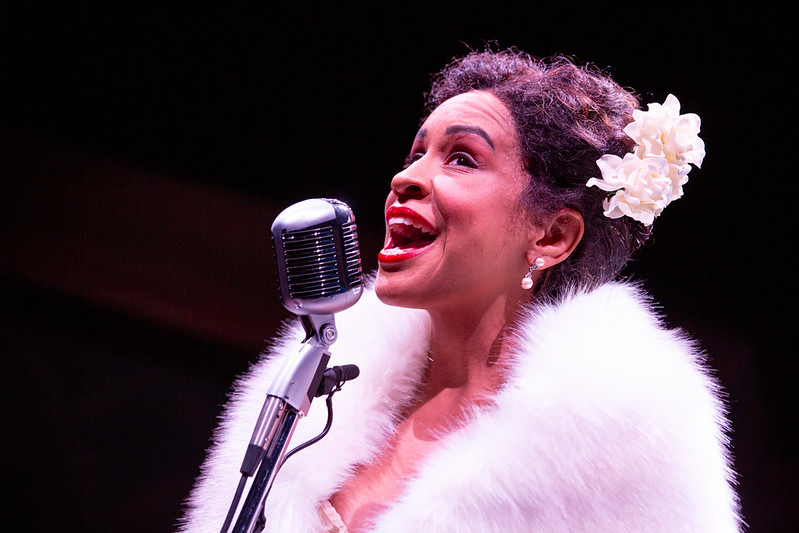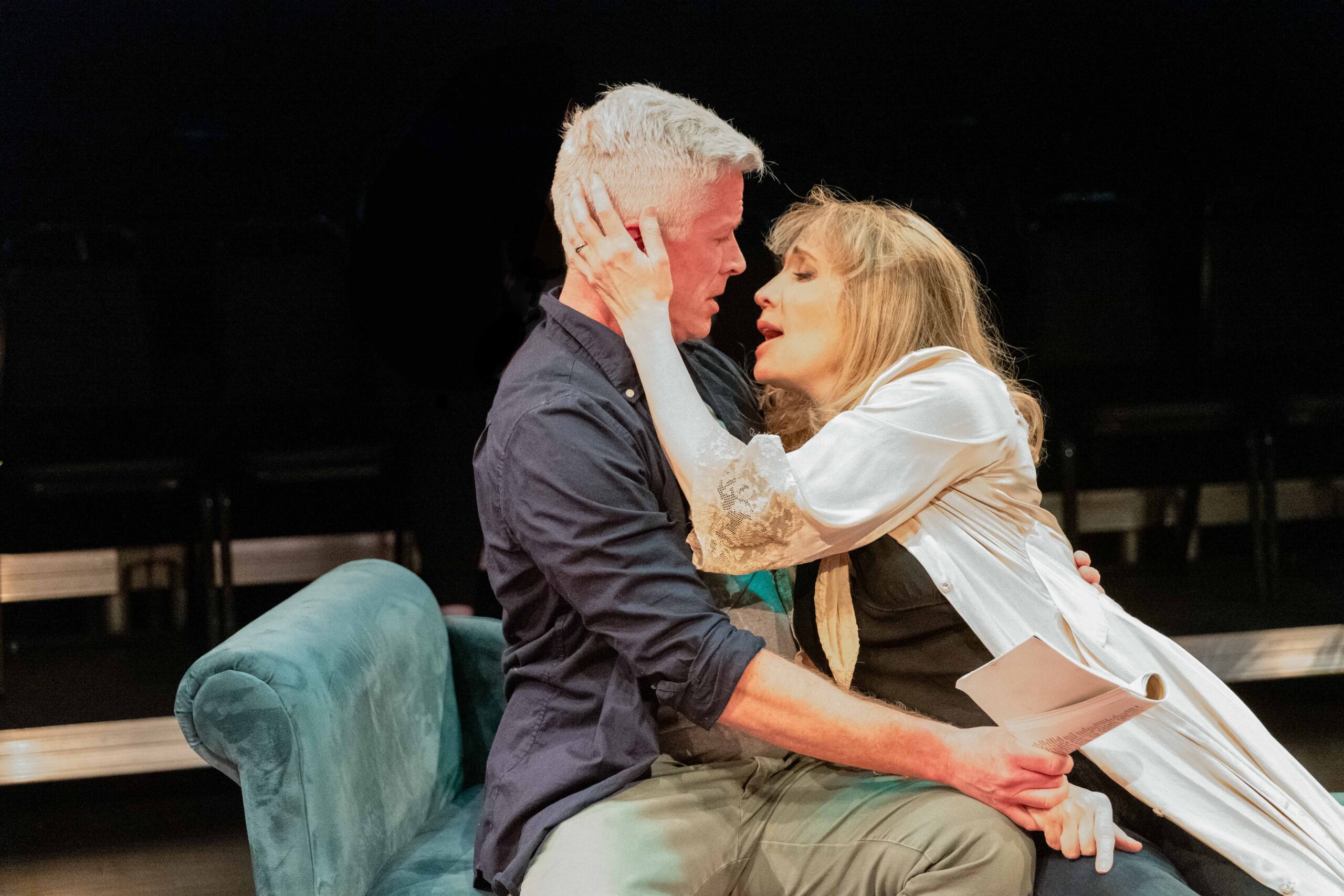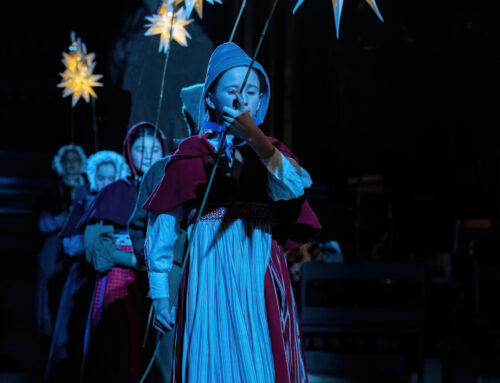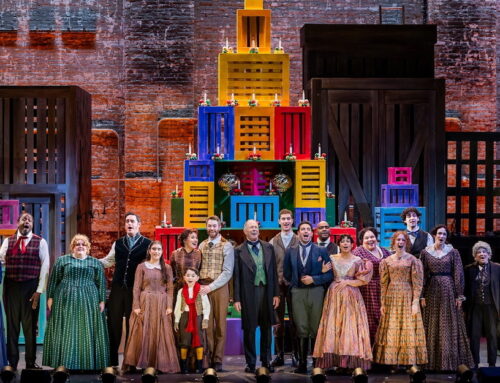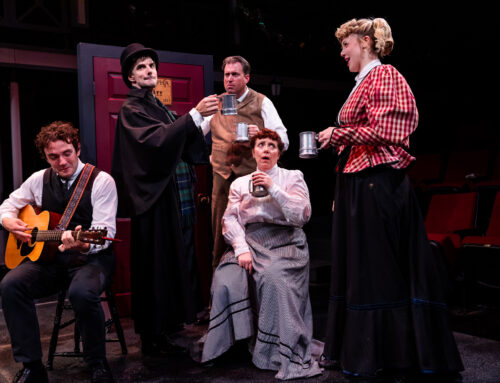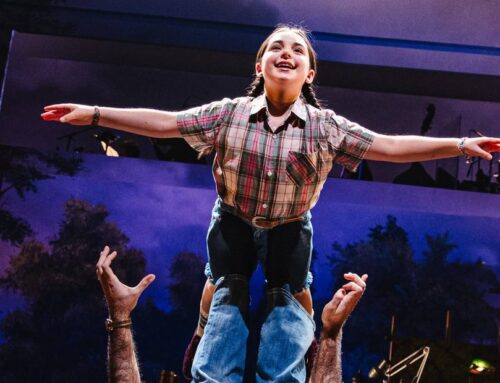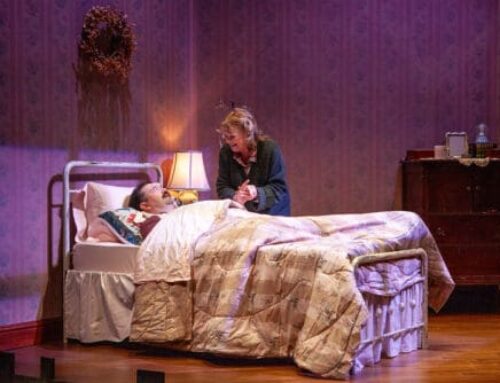An excellent performance and a moving piece of theater awaits you in Lowell at the MERRIMACK REPERTORY THEATRE! The legend who is Billie Holiday comes alive thanks to Jenece Upton who embodies the singer’s tragic history and indelible vocals. Written by Lanie Robertson and directed by Candice Handy, LADY DAY AT EMERSON’S BAR AND GRILL is a play with music, set in an intimate Philadelphia lounge, 1959, where Billie Holiday sings a life of heartache through her best known songs.
The show finds Holiday onstage in an evening gown, requisite gardenias in hand, and her accompanist Jimmy Powers on piano (John David Eldridge subbing for David Freeman Coleman the day I saw it). “Lady Day” recaps the highs and lows of a hard life riddled with racism, rejection, poverty, drug and alcohol abuse, and bad choices in men, all while falling apart onstage. It’s a tall order for a performer to inhabit a real life persona, fill in the past, propel the tale forward — and SING!
And Ms. Upton can sing. Her voice captures the timbre and sorrow, if not the silky languor and interpretive power that Billie brought to a lyric. But Upton does deliver Holiday’s vulnerability, desperation, and unmistakeable rage as a Black female performer trying to make her way in a white world. Upton triumphs over the show’s exposition-laden formula and burrows into the pain beneath increasingly assured vocals. Her rendition of Holiday’s brutal signature song STRANGE FRUIT–kills.
See LADY DAY AT EMERSON’S BAR AND GRILL at Merrimack Repertory Theatre through February 23.
I do however, have major reservations about STAGE KISS by Sarah Ruhl now onstage at the BCA’s PLAZA BLACK BOX THEATRE. The play is presented by The Psych Drama Company whose stated mission is to produce “immersive performances” which “examine theatrical works through a psychological lens.” I was ready for something new and layered. What I experienced was a sub par production that left me distinctly un-immersed and fleeing the talk back– along with most if not all of the audience.
The production stars company artistic director and clinical psychologist Wendy Lippe, Ph.D. as “She”opposite Kenneth Kelleher as “He,” two actors with a romantic past who suddenly find themselves cast as former lovers in a dated romantic melodrama which mirrors the same circumstances.
In the course of the production, old wounds and unresolved issues are re-opened and explored. It’s a heck of a juicy premise, and “tonally slippery” which requires the balance provided by nimble acting and subtle direction so the piece slides smoothly along the edges between comedy and romance, present and past, truth and fiction, art and life, eventually blurring those boundaries so these realities resonate, while we ponder the echoes and find ourselves laughing along the way. That didn’t happen.
Out of the gate, the performances got in the way of these characters, so the point of departure for me was corrupted. I wish director Rani O’Brien had reined in all the ACTING. In the first scene, Wendy Lippe launches herself onto the stage as “She,” an insecure actress auditioning for the first time in a decade, and Lippe plays it over the top frantic. When “She” accidentally spills the contents of her bag on the floor, Lippe goes way past frantic to absolutely manic. Ruhl is no doubt having some fun with actors and acting, but where’s the nuance? the vulnerability of the real person Lippe is playing?
Same goes for the melodrama She and He are rehearsing, which is supposed to open a portal to old unresolved feelings between them. I watch a lot of 1930’s dramas on TCM, and they still work because the actors believe in the conventions, no matter how stilted the dialogue, and how arch their mid-Atlantic accents. Here, Lippe and Kelleher as She and He overplay their old-fashioned counterparts with a wink and nod–not only short-circuiting the laughs, but also preventing us from understanding how this material could have triggered anything real between them.
There’s also no palpable chemistry between the pair. Not until the second act does this duo become at all believable as a couple.– onstage or off. Act II does elicit some legitimate laughs when the two– now cast as a hooker from Brooklyn and a member of the IRA– whip out dueling “Noo Yawk” and northern Irish accents. It takes a good actor to “act” badly, and Zachary Ryan Murphy as the clueless director and David Kleinman as Kevin the hapless understudy needed to take it down a notch and trust the material.
Finally, the “immersive” bit of business the company added to involve the audience before the start of the play, was poorly executed. Nothing is more off-putting than awkwardly calling attention to the artifice of what one is about to experience.
The intimacy of theater, as opposed to movies, can be embarrassing, and is perhaps epitomized by the stage kiss, as Ruhl’s characters observe in the play. To my way of thinking, in order to free up an audience to transcend such embarrassment and relate to the drama at hand, an actor must loosen their grip on the outcome and lean into the lie at hand which — as everyone from Shakespeare to Picasso to Ruhl herself has noted–is the lie that tells the truth.
STAGE KISS is on stage at the BCA’s PLAZA BLACK BOX THEATRE through February 23.

